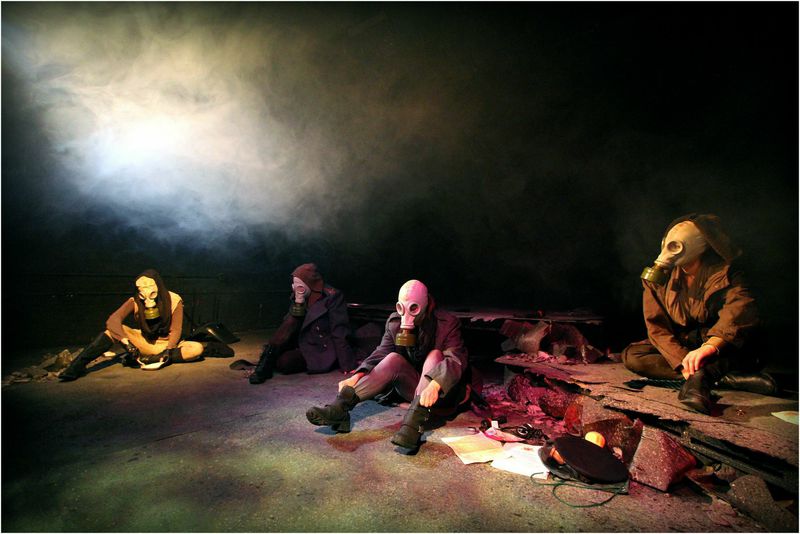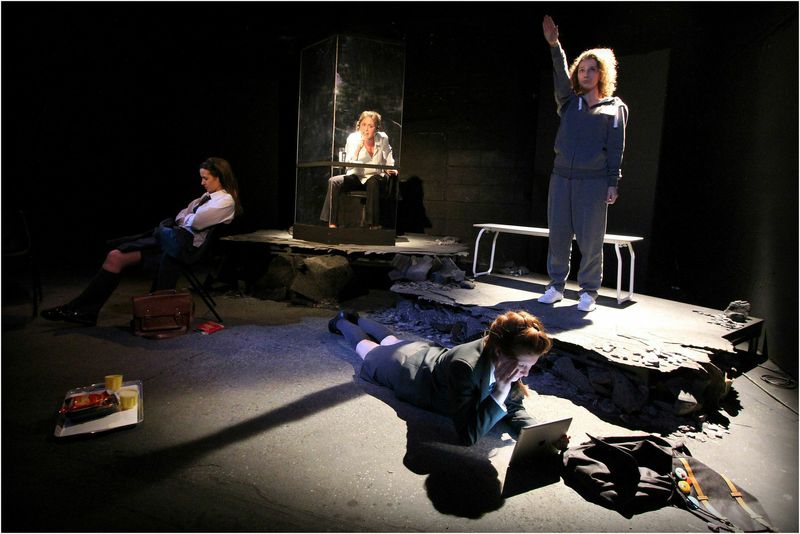SOPHIE MEADOWS reviews a double bill at the Tristan Bates Theatre: Catriona Kerridge’s contemporary ‘Shoot, I Didn’t Mean That’; followed by the reactionary war-time play which inspired it, ‘The Last Days of Mankind: The Last Night’.
At a time of daily global crises and the current commemoration of the First World War, the productions being put on at the Tristan Bates Theatre seem especially relevant. ’Shoot, I Didn’t Mean That’ and ‘The Last Days of Mankind’ investigate Western reactions to conflict, and are linked by the concept of war-induced destruction and disillusionment. They have in common the exploration of how, in the face of brutality, unpremeditated acts may have damning and long-term consequences.Their intrinsic connection to one another is reinforced by the all-female cast that acts all the parts in both performances.
In ‘Shoot, I Didn’t Mean That’, three stories run in tandem to one another. The first of these revolve around Jessie and Emma. Emma (Jocasta King) is the familiar bossy, self-important child, whose over-confidence will lead her to accidentally commit an act that will haunt her for life. There is a pleasing ‘Lord of the Flies’ element to the relationship between domineering Emma and her friend Jess (Alexa Hartley), the latter of whom carries off her tricky role as the passive beta well. Childish politics are cleverly portrayed as their girlish games go to far.
Meanwhile, Sarah (Emily Bairstow) is presiding over a war-crimes trial. Despite being referred to as an interpreter, translating is as far as her duties go; by virtue of her job description, she is not allowed an opinion. Instead, she must objectively translate the defence of the accused. This contrasts interestingly with Emma and Jess, whose western education, age and social situation allow them the ability to formulate their own opinions, and yet conversely, the freedom to be complacent, as they giggle their way through the commemorative two minutes silence.
The third story-line belongs to Juliet (Alexine Lafaber), a British tourist who has been imprisoned in Austria as a neo-Nazi, after she ignorantly interprets a situation incorrectly. Her story is farcical and her monologues clumsy and flippant, resulting in comedy despite the gravity of her situation.
All four characters descend into tribal, delusional behaviour as they are affected by different conflicts. The concept that violence can result in violent behaviour in impressionable people is cleverly implied when Sarah drawn insults and devil signs on her transparent interpreter’s booth, around the faces of those on trial. They are written, however, for the audience’s perspective, so that Sarah inadvertently labels herself with the same crude words meant for the accused.
Bairstow delivers her lines as Sarah with admirable and unusual spontaneity, and is the obvious star of both plays. A particularly memorable scene with a carrot causes belts of laughter from the audience, and her part contributes most obviously to the comedy of the play.
Kraus’ play ‘The Last Days of Mankind: The Last Night’ is acted with a great focus on musicality and rhythm, opening with a scene in which four war-time scavengers beat their new-found items on the floor to a beat. The effect is undeniably disturbing and the cast manages to avoid the easy pitfall of allowing their rhyming couplets to sound formulaic.
The play poignantly warns of the danger of ‘when the crazy world is ruled by dynamite’, and makes the bleak point that the few people who benefit from war are those who are prepared to exploit its tragedy for personal gain, and consequently profit from slaughter. Amongst these limited few are scavengers, the self-professed ‘hyenas’, and war reporters.
War reporters are portrayed as especially sordid, and leave a chilling impression on an audience which is numbed to global horrors by the sheer volume of war journalism: ‘not born for fighting we’ll slowly withdraw, and call what we’re writing Impressions Of War’.
As the worst of humanity is exposed, both plays show the futility of war and the disillusionment it may result in, whilst demonstrating the commonplace complacency in regard to global crisis.
‘Shoot, I Didn’t Mean That’ and ‘The Last Days of Mankind: The Last Night’ are showing at the Tristan Bates theatre near Leicester Square until the 18th October. For more information and tickets, please click HERE.
Shoot I Didn’t Mean That / The Last Days of Mankind | Shows | Tristan Bates Theatre
tristanbatestheatre.co.uk






